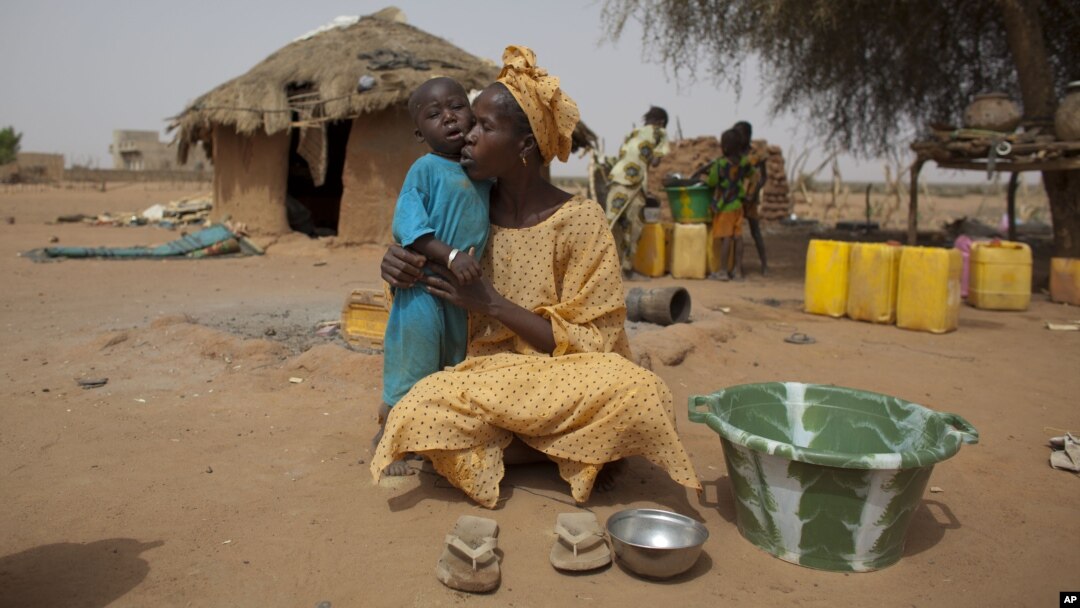DAKAR —
The U.N. Office for the Coordination of Humanitarian Affairs (OCHA) says $1 billion is still required for emergency needs in Africa's Sahel region, which stretches from Senegal in the west to Chad in the east.
To date, humanitarian agencies say they have received only about one-third of the requested $1.7 billion needed to help the more than 11 million people in the Sahel who face food insecurity this year. That number includes 4.9 million children under five and pregnant mothers who are at risk of acute malnutrition.
The United Nations Office for the Coordination of Humanitarian Affairs (OCHA) says the food security and nutrition situation in the Sahel is expected to remain critical in coming months, in the region's "lean season."
To help the most vulnerable people in the region, humanitarian organizations requested $1.7 billion in funding for 2013, but, so far, have received just over $600 million.
"Today, middle of the year, we are only one-third funded for our appeal. That means we have a $1 billion funding gap, said Robert Piper, the U.N. regional humanitarian coordinator for the Sahel. "That translates into a whole range of programs that we simply cannot extend. It’s food assistance to families that we just can’t reach. It’s assistance of emergency kind to farmers who are missing a season to plant, which means they’ll be back perhaps next year for food aid."
Piper said that the agricultural and refugee sectors are particularly underfunded.
In Burkina Faso, for example, only three percent of the requested agricultural funds for 2013 have been received. In Mauritania, only 14 percent of funding for water and sanitation aid has been granted.
Piper said that high food prices, following last year’s drought, have left families even more vulnerable.
He said many can’t afford to buy staple foods, such as rice and millet, which, in many cases, cost 50 to 60 percent more than the average price over the last five years.
The ongoing crisis in Mali has also left nearly 600,000 refugees and 450,000 displaced persons in need of aid.
Piper warned that if more funding for the region isn’t received soon, the situation is likely to deteriorate even further.
"Clearly we have to be very worried about the immediate needs. These are families that we won’t reach if funding doesn’t come through. It’s calories not distributed to families in need. It’s nutrition programs that are not delivered. There are health care programs following epidemics that can’t be put in place," he said.
OCHA says they are now calling on donors to close the funding gap.
To date, humanitarian agencies say they have received only about one-third of the requested $1.7 billion needed to help the more than 11 million people in the Sahel who face food insecurity this year. That number includes 4.9 million children under five and pregnant mothers who are at risk of acute malnutrition.
The United Nations Office for the Coordination of Humanitarian Affairs (OCHA) says the food security and nutrition situation in the Sahel is expected to remain critical in coming months, in the region's "lean season."
To help the most vulnerable people in the region, humanitarian organizations requested $1.7 billion in funding for 2013, but, so far, have received just over $600 million.
"Today, middle of the year, we are only one-third funded for our appeal. That means we have a $1 billion funding gap, said Robert Piper, the U.N. regional humanitarian coordinator for the Sahel. "That translates into a whole range of programs that we simply cannot extend. It’s food assistance to families that we just can’t reach. It’s assistance of emergency kind to farmers who are missing a season to plant, which means they’ll be back perhaps next year for food aid."
Piper said that the agricultural and refugee sectors are particularly underfunded.
In Burkina Faso, for example, only three percent of the requested agricultural funds for 2013 have been received. In Mauritania, only 14 percent of funding for water and sanitation aid has been granted.
Piper said that high food prices, following last year’s drought, have left families even more vulnerable.
He said many can’t afford to buy staple foods, such as rice and millet, which, in many cases, cost 50 to 60 percent more than the average price over the last five years.
The ongoing crisis in Mali has also left nearly 600,000 refugees and 450,000 displaced persons in need of aid.
Piper warned that if more funding for the region isn’t received soon, the situation is likely to deteriorate even further.
"Clearly we have to be very worried about the immediate needs. These are families that we won’t reach if funding doesn’t come through. It’s calories not distributed to families in need. It’s nutrition programs that are not delivered. There are health care programs following epidemics that can’t be put in place," he said.
OCHA says they are now calling on donors to close the funding gap.


